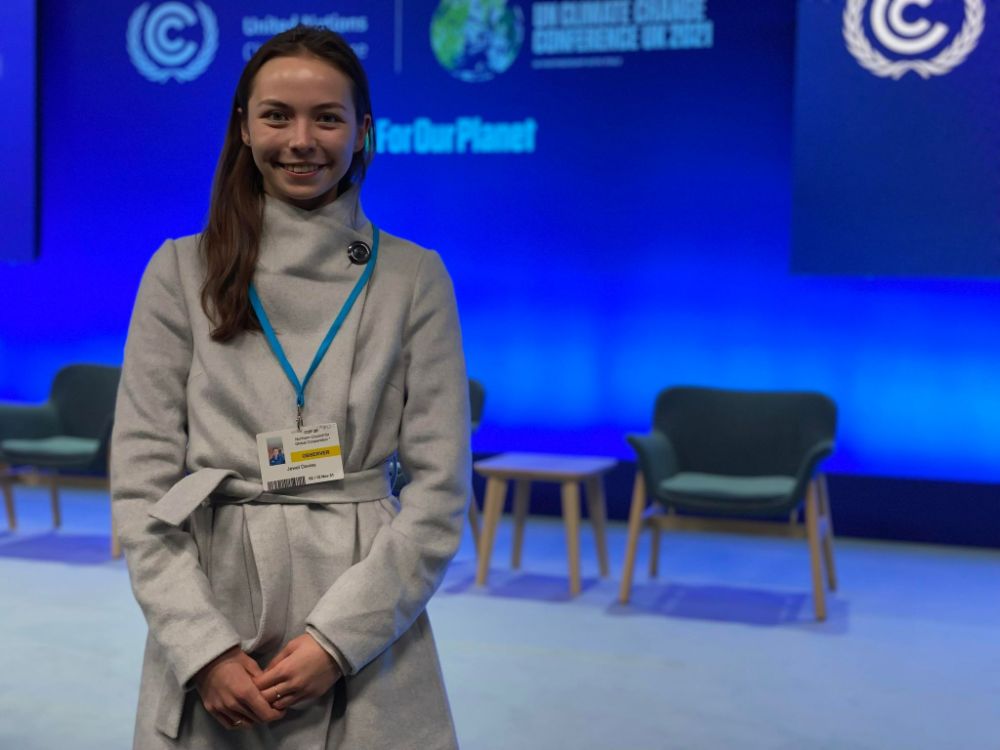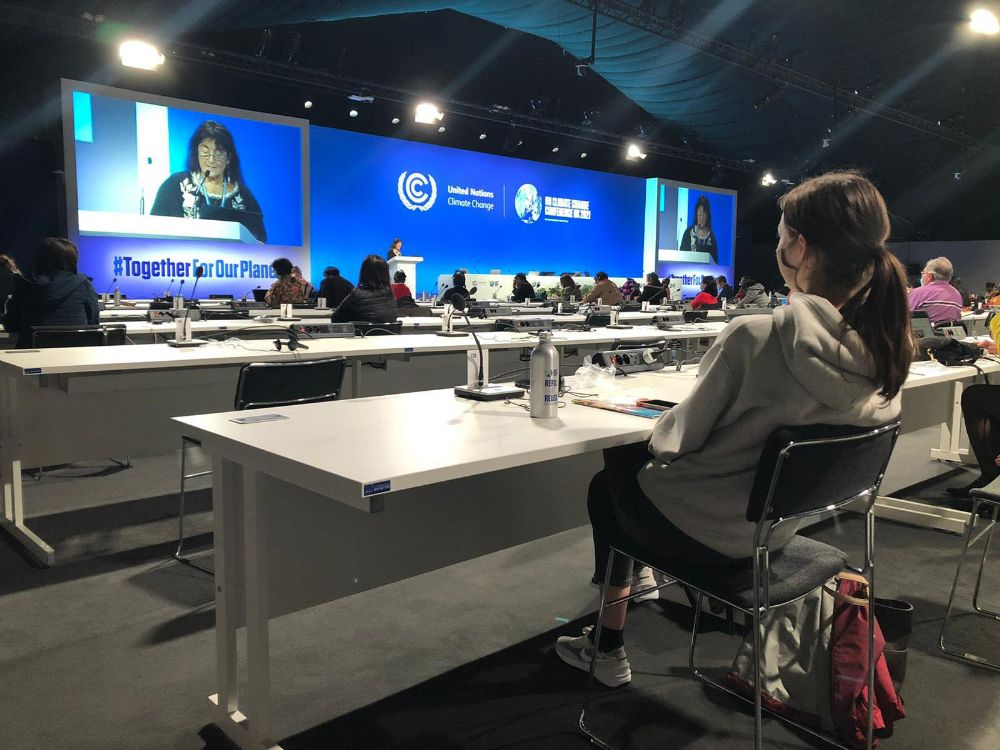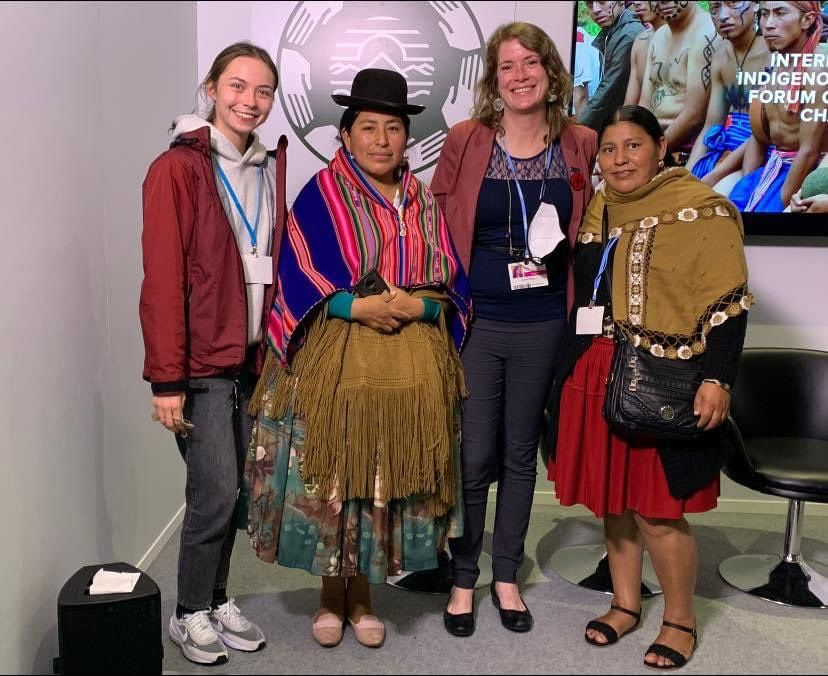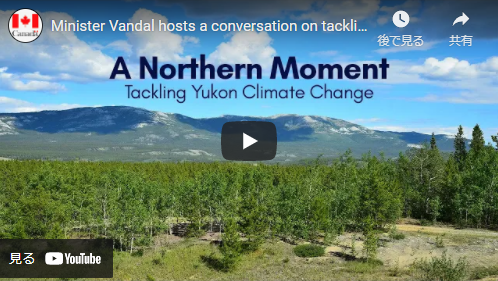6.5 先住民族の視点で見る「気候変動」
「二つの目で見る」Twe-eyed seeingや「地域密着型研究」Community-based researchで見たように、先住民族の人々との共働は教育や研究の現場の脱植民地化、インディジナイゼーションに至る方法です。しかしそれだけではなく、今日の地球規模の環境問題の解決には、先住民族の視点や知恵が不可欠です。
ユーコンでは、地域密着型研究によって気候変動や野生生物の資源管理に取り組んだ例が多数報告され、現在も進行しています。科学や行政に足りないところに伝統知を「官僚的な方法で」取り入れるという考え方ではうまくいかない、という点が重要で、枠組みや話し合いの方法から双方を取り入れなければ、結局は伝統のよいところを生かすことができないと考えられています。ではどうしたらいいのでしょうか。
まずは、実際に先住民族の人々の行為や歴史を知り、理解しないと始まらないのではないかと思います。人々と土地の関わり合いを知るうえで、優勢言語では表現できない情報を得るには伝統言語が必要ですが、伝統言語は消滅の危機に瀕している可能性があります。歴史において先住民族の視点がどのように生かされたかの記録は、主流社会の記録には残っていない可能性があります。そのとき頼れるのは、オーラルヒストリー、物語ではないでしょうか。
留学中、私と多くの科目を一緒に受けていた学生の一人が、カークロス・タギッシュ・ファーストネーションのジュエルでした。彼女は、在学中から気候変動に関する調査プロジェクトに参加し、2021年11月には、英国スコットランドで開催された第26回気候変動枠組条約締約国会議(COP26)にカナダ先住民族の一人として参加しました。
気候変動コーディネーター兼ユース・アンバサダー、ジュエル・デービス(Jewel Davis Climate Change Coordinator & Youth Ambassador, Carcross / Tagish First Nation)の活動を紹介します。

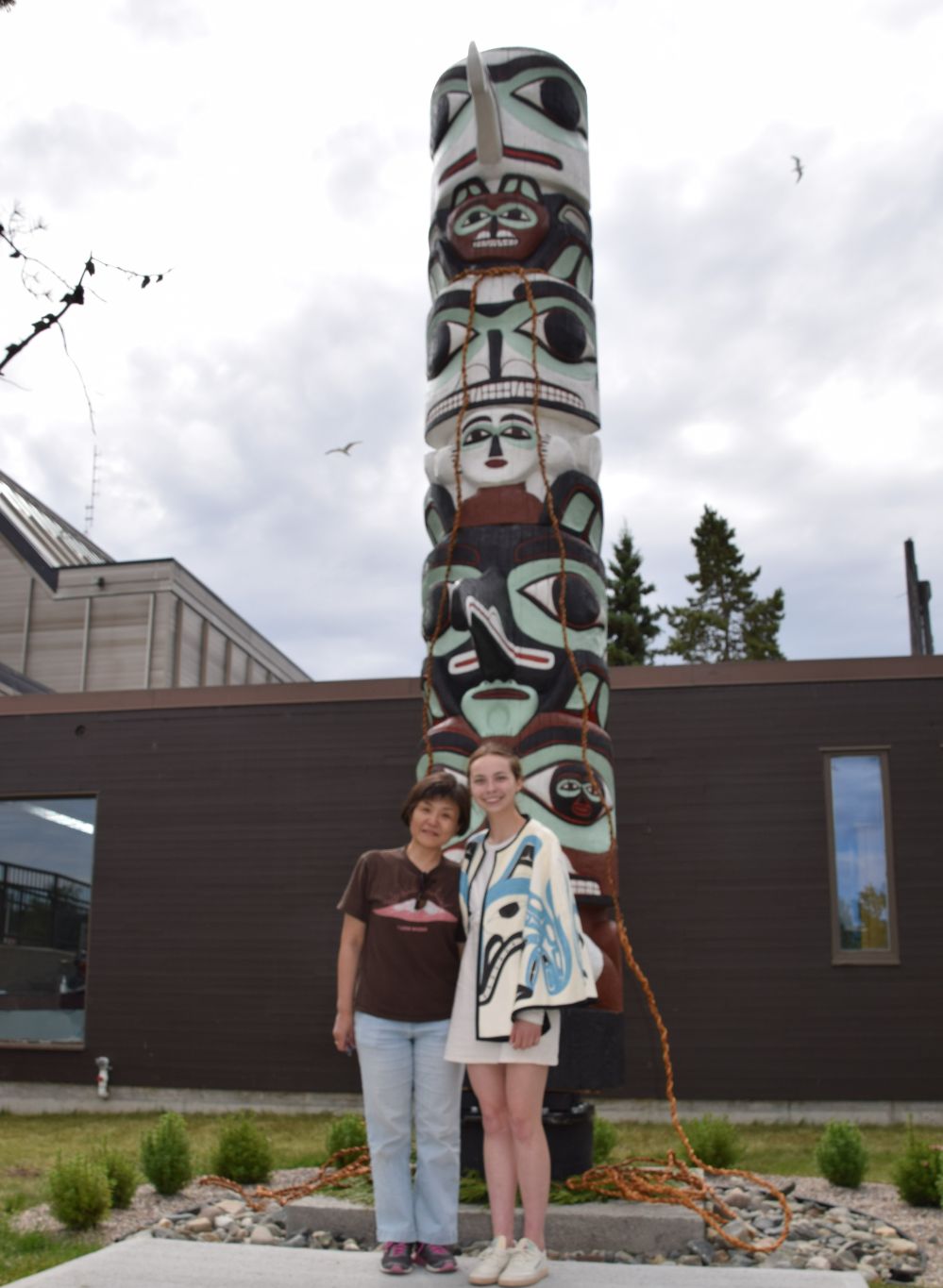
ジュエルが参加しているプロジェクト「How We Walk with Land and Water(私たちは大地と水とともにどのように歩んでいくか)」は、気候変動を科学的データと地域知・伝統知を通してモニタリングし、未来の土地・水資源活用プラン構築と実施をめざしています。
We must reconnect and build our relationship with mother earth, each other and ourselves to create a healthy world.
「私たちは健全な世界を生み出すため、母なる大地との関係、人と人との関係、そして自身との関係を築き、紡ぎ直さなくてはなりません。」
~ ジュエル・デービスの言葉 Jewel Davis Climate Youth Ambassador (How We Walk with Land and Water)
 How We Walk with Land and Water(プロジェクトの成果をまとめた動画 DIR. Jewel Davies, 2024, Yukon | 28 MIN)
How We Walk with Land and Water(プロジェクトの成果をまとめた動画 DIR. Jewel Davies, 2024, Yukon | 28 MIN)
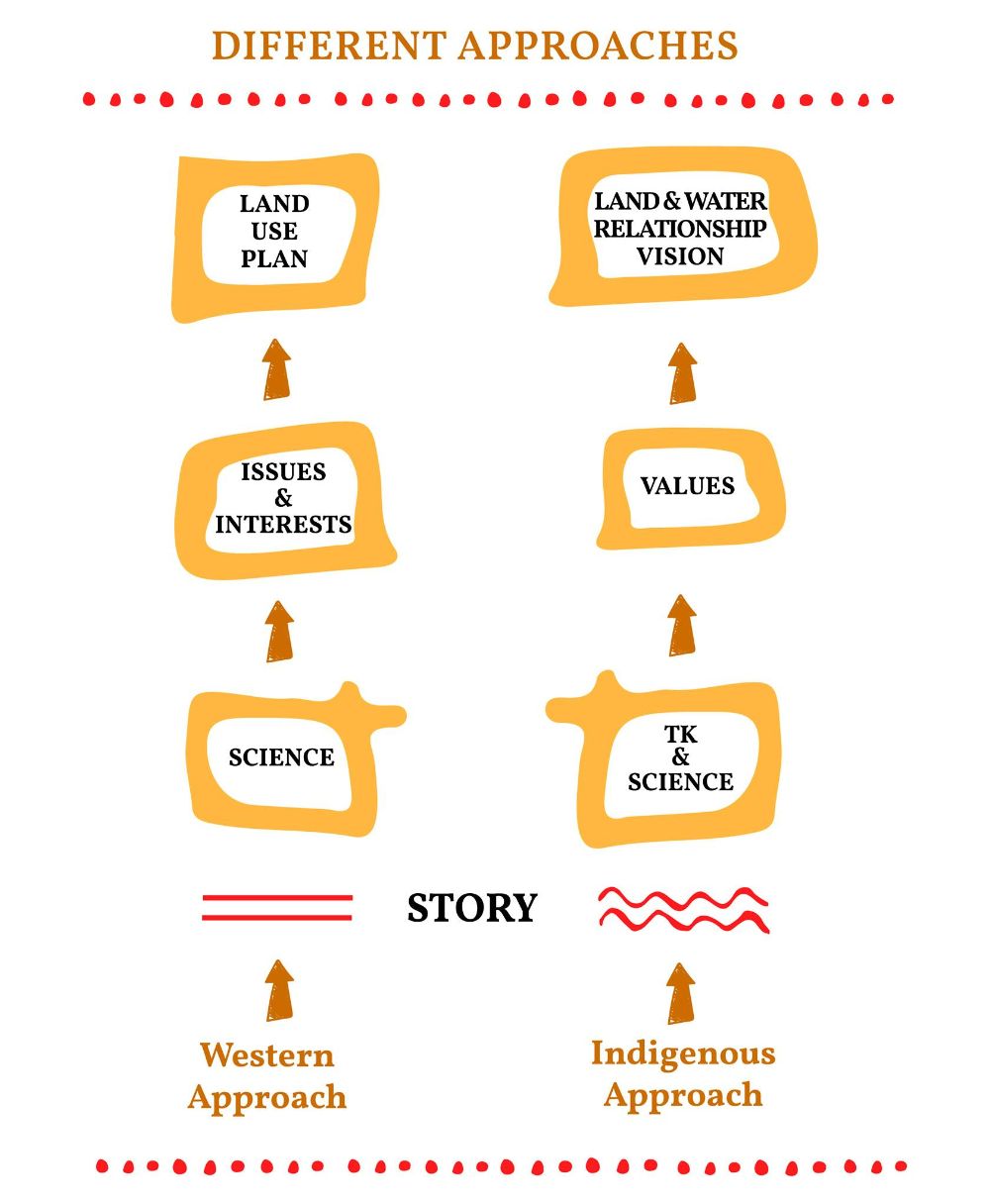
【カナダ公共放送CBCニュースより】
COP26に参加した経験をカナダ国営放送CBCニュースで語るジュエル(08分30秒頃~)
【カナダ公共放送CBCラジオより】
https://www.cbc.ca/listen/live-radio/1-206/clip/15864728
2021年の夏、このプロジェクトで行った調査活動についてラジオで語るジュエルのインタビュー。伝統的な知恵と科学的データをどのように扱っているかを話しています。
【COP26から帰ってきた直後のジュエルのメッセージ】
(英語の原文の下に、和訳を示しました。このメッセージは、本ウェブサイト ユーコン編で伝えるべきすべてのメッセージを含んでいるように思います。)
COP26 has been so many things, overwhelming, new, busy, an incredible learning experience. It was also the most colonialist space I have ever been in throughout my life. This speaks volumes to me being that COP26 was an international conference on climate change. Nation States were pushing for market-based solutions, carbon trading and offsets, and carbon markets which are all false climate solutions as they are rooted in the same worldview and support the same economic structure that has directly caused the climate crisis.
At COP I had the incredible privilege of listening to and learning from Indigenous knowledge holders from around the world. The Indigenous leaders from around the globe are the ones we should be upholding and they should be given the platforms to speak their truth for these are true, effective, and real climate solutions.
Indigenous peoples still hold the strong umbilical connection to Mother Earth we are all meant to share. We all come from this earth as humans, Indigenous and Non-Indigenous peoples and we all need to recognize that and treat the land with the respect it deserves. We must work together with the land and give back what is gifted to us and provides us life, as we are all intrinsically interconnected. Indigenous knowledge looks at the big picture and understands how systems work together. Indigenous peoples have lived on this land since time immemorial and have worked in harmony and balance with the land and animals. This is because of the deep respect towards the land held by Indigenous peoples. We need to create a healthy and reciprocal relationship with our environment, and this can only be done by following and listening to Indigenous leadership and knowledge. When we talk about climate change, we are talking about systems change, we are talking about reconnection.
I am very grateful and appreciative for the experience of attending COP26. And gunalchéesh, thank you to the Northern Council for Global Cooperation for providing with this incredible opportunity ❤️
Gunalchéesh
COP26ではたくさんのことが起こり、圧倒され、目新しく、忙しく、素晴らしい学びの経験ができました。COP26は、私のこれまでの人生の中で、最も植民地主義的な空間でもありました。COP26 は気候変動に関する国際会議だったということを思い知りました。国民国家の国々は、市場本位の解決策、炭素取引やカーボンオフセット、炭素市場を推進しようとしていました。しかしこれらは気候危機をもたらした当の世界観に基づき、その経済構造を支持する誤った解決方法です。
COPでは、私は世界中から集まった先住民族有識者の話を聞き、学びを得る素晴らしい機会に恵まれました。世界の先住民族リーダーたちこそ、私たちが支持していくべき人々です。これこそが気候変動に対する正しく効果的かつ現実的な解決法だと発言するためのプラットフォームを、彼らが与えられるべきです。
先住民族は、今も母なる大地と密接な関係を保っており、私たちは皆この母なる大地を分かち合って生きなくてはなりません。私たちは皆、先住民族であれ、非先住民族であれ、人としてこの地球に生まれました。私たちは皆、このことを心にとめ、この大地を正当な敬意を払ってもてなさなくてはなりません。私たちは大地とともに働き、大地が私たちに授けてくれたもの、命を与えてくれたものを大地にお返ししなくてはなりません。なぜなら私たちは皆、相互につながりあっている存在だからです。先住民族の知恵は世界の全体像を捉え、システムが全体としてどのように働くのかを理解します。先住民族は有史以来、この大地の上に住まい、大地や動物たちとともに調和とバランスを保ってきました。これは先住民族の人々が大地に対して抱いてきた深い敬意があるからです。私たちは、人と環境との健全で互恵的な関係を創る必要があります。それは先住民族のリーダーシップと知識に従い、耳を傾けることで初めてなしえることです。気候変動について語るとき、私たちはシステムの変化、つながり直しについて語っているのです。
私はCOP26に参加した経験を喜び、感謝しています。私にこのような素晴らしい機会を与えてくれたことを、国際協力北方委員会に感謝します。
Gunalchéesh(ありがとう)
(葛西訳)
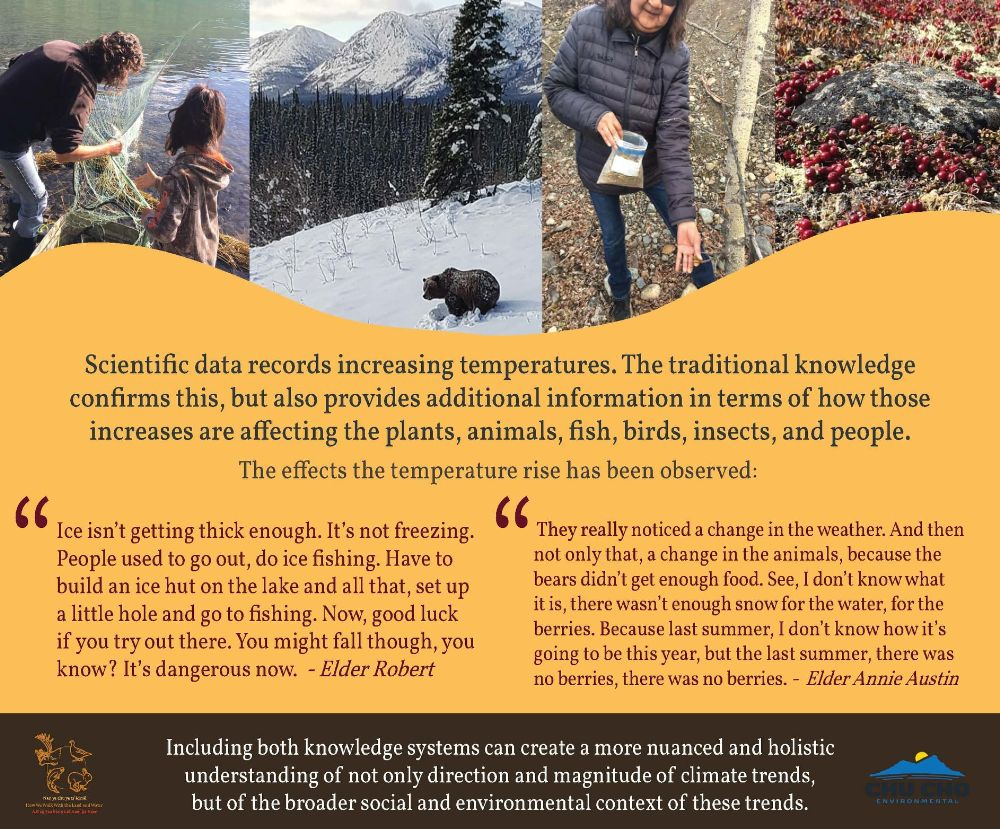
気候変動のモニタリングと課題解決に取り組む若者のプロジェクトは、カナダ連邦政府も支援しています。

